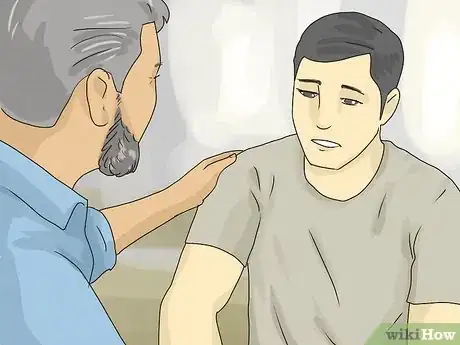This article was co-authored by Asa Don Brown, PhD, DNCCM, FAAETS and by wikiHow staff writer, Nihal Shetty. Dr. Asa Don Brown is a Clinical Psychologist with over 25 years of experience. He specializes in working with families, children, and couples, treating a variety of psychological disorders, trauma, and abuse. Dr. Brown has specialized in negotiation and profiling. He is also a prolific author having published three books and numerous articles in magazines, journals, and popular publications. Dr. Brown earned a BS in Theology and Religion with a minor in Marketing and an MS in Counseling with a specialization in Marriage and Family from The University of Great Falls. Furthermore, he received a PhD in Psychology with a specialization in Clinical Psychology from Capella University. He is also a candidate for a Masters of Liberal Arts through Harvard University. Dr. Brown is a Fellow of the American Academy of Experts in Traumatic Stress and a Diplomate for the National Center for Crisis Management and continues to serve a number of psychological and scientific boards.
There are 8 references cited in this article, which can be found at the bottom of the page.
This article has been viewed 4,056 times.
Infidelity can feel like an earth-shattering event. If you’ve found yourself reliving the experience of infidelity in your daily life, you might be feeling exhausted, angry, upset, and unsure of if you want to stay in your relationship. As your brain reexamines the past you’ve shared with your partner, it’s normal to feel episodes of sadness and flashbacks to the pain you’ve experienced. We’re here to help with this guide on how to stop reliving infidelity.
Steps
Expert Q&A
-
QuestionDoes infidelity pain ever go away?
 Steven Hesky, PhDDr. Steven Hesky is a Licensed Clinical Psychologist with over 37 years of experience. He specializes in long-term psychotherapy with adults and adolescents. His training includes Freudian, Jungian, and Existential approaches to psychotherapy, hypnosis, family therapy, marriage counseling, and biofeedback. Dr. Hesky holds a BA in Philosophy from Lake Forest College and an MA and PhD in Existential Clinical Psychology from Duquesne University.
Steven Hesky, PhDDr. Steven Hesky is a Licensed Clinical Psychologist with over 37 years of experience. He specializes in long-term psychotherapy with adults and adolescents. His training includes Freudian, Jungian, and Existential approaches to psychotherapy, hypnosis, family therapy, marriage counseling, and biofeedback. Dr. Hesky holds a BA in Philosophy from Lake Forest College and an MA and PhD in Existential Clinical Psychology from Duquesne University.
Licensed Clinical Psychologist It's definitely going to take time for the pain to go away and the trust to develop again, since there's always the need to deal with the issues which have led to the betrayal. Be aware that the relationship may never be quite the same again. But that doesn't mean that it isn't worthwhile, or that it can't work out.
It's definitely going to take time for the pain to go away and the trust to develop again, since there's always the need to deal with the issues which have led to the betrayal. Be aware that the relationship may never be quite the same again. But that doesn't mean that it isn't worthwhile, or that it can't work out.
References
- ↑ Mental Health America. Non-Profit Organization. Expert Interview.
- ↑ https://www.psychologytoday.com/us/blog/mood-thought/201307/four-tips-habit-research-reduce-worry-and-rumination
- ↑ Mental Health America. Non-Profit Organization. Expert Interview.
- ↑ https://link.springer.com/article/10.1007%2Fs12671-015-0427-2
- ↑ https://www.psychologytoday.com/us/blog/wander-woman/201507/5-steps-managing-your-emotional-triggers
- ↑ Steven Hesky, PhD. Licensed Clinical Psychologist. Expert Interview. 2 September 2021.
- ↑ https://www.goodtherapy.org/blog/want-to-save-your-relationship-tell-the-truth-about-your-affair-0627185
- ↑ Steven Hesky, PhD. Licensed Clinical Psychologist. Expert Interview. 2 September 2021.
- ↑ Mental Health America. Non-Profit Organization. Expert Interview.
- ↑ Steven Hesky, PhD. Licensed Clinical Psychologist. Expert Interview. 2 September 2021.
- ↑ https://www.goodtherapy.org/learn-about-therapy/issues/infidelity/recovery
- ↑ Mental Health America. Non-Profit Organization. Expert Interview.
- ↑ https://www.health.harvard.edu/blog/self-care-4-ways-nourish-body-soul-2017111612736
- ↑ Steven Hesky, PhD. Licensed Clinical Psychologist. Expert Interview. 2 September 2021.
- ↑ Mental Health America. Non-Profit Organization. Expert Interview.
- ↑ https://www.goodtherapy.org/learn-about-therapy/issues/infidelity/recovery
- ↑ Steven Hesky, PhD. Licensed Clinical Psychologist. Expert Interview. 2 September 2021.
- ↑ https://www.goodtherapy.org/learn-about-therapy/issues/infidelity/recovery








































































